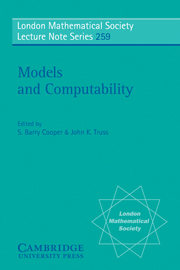Book contents
- Frontmatter
- Contents
- Preface
- Continuous Functionals of Dependent and Transfinite Types
- Degree-Theoretic Aspects of Computably Enumerable Reals
- Simplicity and Independence for Pseudo-Algebraically Closed Fields
- Clockwork or Turing U/universe? - Remarks on Causal Determinism and Computability
- A Techniques Oriented Survey of Bounded Queries
- Relative Categoricity in Abelian Groups
- Computability and Complexity Revisited
- Effective Model Theory: The Number of Models and Their Complexity
- A Survey on Canonical Bases in Simple Theories
- True Approximations and Models of Arithmetic
- On the Topological Stability Conjecture
- A Mahlo-Universe of Effective Domains with Totality
- Logic and Decision Making
- The Sheaf of Locally Definable Scalars over a Ring
- Human Styles of Quantificational Reasoning
- Recursion Theoretic Memories 1954–1978
- Fields Definable in Simple Groups
- A Combinatory Algebra for Sequential Functionals of Finite Type
- Model Theory of Analytic and Smooth Functions
True Approximations and Models of Arithmetic
Published online by Cambridge University Press: 17 May 2010
- Frontmatter
- Contents
- Preface
- Continuous Functionals of Dependent and Transfinite Types
- Degree-Theoretic Aspects of Computably Enumerable Reals
- Simplicity and Independence for Pseudo-Algebraically Closed Fields
- Clockwork or Turing U/universe? - Remarks on Causal Determinism and Computability
- A Techniques Oriented Survey of Bounded Queries
- Relative Categoricity in Abelian Groups
- Computability and Complexity Revisited
- Effective Model Theory: The Number of Models and Their Complexity
- A Survey on Canonical Bases in Simple Theories
- True Approximations and Models of Arithmetic
- On the Topological Stability Conjecture
- A Mahlo-Universe of Effective Domains with Totality
- Logic and Decision Making
- The Sheaf of Locally Definable Scalars over a Ring
- Human Styles of Quantificational Reasoning
- Recursion Theoretic Memories 1954–1978
- Fields Definable in Simple Groups
- A Combinatory Algebra for Sequential Functionals of Finite Type
- Model Theory of Analytic and Smooth Functions
Summary
Introduction
All structures here have recursive language and recursive universe–we could take the universe to be ω or a finite initial segment. A structure A is identified with its atomic diagram D(A). Thus, the Turing degree of A is the degree of D(A). Non-standard models of PA are among the most self-aware of all mathematical structures, but they do not know that they are nonstandard. This results in some interesting properties, both model-theoretic and recursion-theoretic.
The self-awareness properties are related to the definability of satisfaction, for formulas of bounded complexity, coupled with a coding of definable sets in divisibility types. For an arbitrary structure A, Tn(A)= Th(A)∩Σn is, uniformly in A and n, for n≥1. Thanks to the self-awareness properties, we have Feferman's observation that if A is a non-standard model of PA, then Tn(A)≤TA for all n.
The fact that a non-standard model of PA does not know that it is non-standard means that we can carry out certain constructions and operations internally (i.e., definably), which would be impossible externally. In particular, we can determine a total function on the model by giving the value at 0 and saying how the value at x+1 is determined from the value at x – never mind that the order type of the model is ω + (ω* + ω)·η.
- Type
- Chapter
- Information
- Models and Computability , pp. 255 - 278Publisher: Cambridge University PressPrint publication year: 1999
- 8
- Cited by

